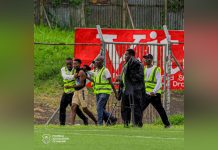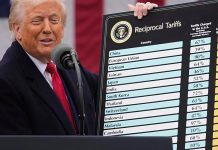Africa-Press – Lesotho. PRIME Minister Moeketsi Majoro has declared a state of emergency to pave way for the reconvening of parliament to pass the much-delayed reform bills ahead of the 7 October 2022 elections.
The emergency declaration had been widely expected to breathe a new lease of life into the much-delayed reform process which has seen numerous deadlines for completion being set and missed. Although Dr Majoro’s declaration notice, entitled Declaration of a State of Emergency, 2022 was issued yesterday, it is dated 16 August 2022.
“I, Moeketsi Majoro, Prime Minister of Lesotho, pursuant to section (23)(1) of the Constitution of Lesotho, 1993 and acting in accordance with the advice of the Council of State, and recognising that failure to pass the bills constitute public emergency, by proclamation, declare the state of emergency to exist in Lesotho, from the 16th to the 29th August, 2022,” the notice states.
Dr Majoro explained that parliament’s failure to pass the reform bills, meant to establish enduring peace and stability in Lesotho, constituted a public emergency hence the declaration.
He also told the Southern African Development Community (SADC) meeting in the Democratic Republic of Congo (DRC) yesterday that the Council of State had convened this week to discuss the recall of parliament to finalise the Omnibus Constitutional Bill which encompasses most of the envisaged reforms and the relevant bills.
The Omnibus Bill was still under discussion when King Letsie III disbanded parliament at midnight on 13 July 2022 after the expiry of its five-year term of office.
Senators had refused to pass the Bill, accusing the National Assembly of tampering with certain key clauses including one which seeks to make the King, commander-in-chief of the armed forces.
“Due to the importance of this Bill, the Council of State convened on the 15th and 16th August 2022.
“It resolved that preparations should be made to recall the 10th Parliament, in line with the relevant constitutional provisions, in order to finalise work on the Omnibus Bill,” Dr Majoro told the meeting.
He said the necessary legal procedures and steps were now being followed to recall parliament to conclude the reforms process. Law and Justice Minister, Lekhetho Rakuoane, told the Lesotho Times last night the emergency declaration would create impetus for the conclusion of the reforms process.
The reforms were recommended by SADC in 2016 and are aimed at achieving lasting peace and stability in the country. However, successive governments have failed to implement them.
Adv Rakuoane said the state of emergency declaration was the only tool available for the prime minister to get parliament recalled to complete its work on the reforms.
It would be followed by another gazette specifying when parliament would be recalled. In the notice of declaration, Dr Majoro warned of the consequences of failure by Lesotho to pass all the reform bills.
He said the country risked sanctions and loss of financial and investment support from its international development partners if it failed to pass the bills.
Dr Majoro also raised concern about the possibility of post election violence should Lesotho not pass amendments to key electoral laws. He said it was the government’s legal duty and moral responsibility to safeguard the existence of national stability and prosperity.
The current political climate posed substantial threats, risks, and dangers, he said. He added that Lesotho had endured substantial political instability, injustice and discord going back to the 1960s.
“This situation is continuous and aggravating. We have identified factors that undermined political stability, justice, and peace in our country,” he said.
Unchecked politicisation of the public service, including security agencies, had been identified as some of the major factors undermining political stability and justice.
Loopholes in the constitution and formation of coalition governments, as well unregulated floor crossing in parliament also played a part in undermining peace, Dr Majoro said. This was in addition to inadequate regulation of political parties.
The state of emergency, the PM said, had become necessary to facilitate the implementation of measures to counter and prevent social, economic, security and political damage caused by perennial political instability.
Lesotho missed the initial May 2019 SADC deadline to have fully implemented the constitutional, judicial and security sector reforms due to bickering among politicians and constant changes of governments.
The latest change occurred in May 2020 when then Prime Minister Thomas Thabane’s four party coalition collapsed and made way for the current Moeketsi Majoro-led coalition which is anchored by the All Basotho Convention (ABC) and the Democratic Congress (DC).
All in all, Lesotho has had four different coalition governments in about 10 years. Since the first deadline was missed, SADC had repeatedly revised the targets for the implementation of the reforms but to no avail.
Adv Rakuoane recently warned that there would be severe consequences for failing to implement the reforms. He said Lesotho was heavily dependent on foreign aid and it could ill-afford to lose that assistance over the failure to implement the reforms.
The country’s international development partners had grown increasingly impatient with Lesotho over its failure to implement the reforms. Adv Rakuoane said the government had relied on Section 84(2) of the Constitution for the recall of parliament via the declaration of the state of emergency.
“If, after a dissolution of parliament and before the holding of a general election of members of the National Assembly, the King is advised by the Council of State that owing to a state of war or of a state of emergency in Lesotho, it is necessary to recall parliament, the King shall recall the parliament that has been dissolved.
That parliament shall be deemed to be the parliament for the time being (and the members of the dissolved parliament shall be deemed to be the members of the recalled parliament),” the section states.
The Lesotho Times has been informed that a delegation from the office of SADC Facilitator to Lesotho, South African President Cyril Ramaphosa, last week met with His Majesty King Letsie III at his royal homestead in Matsieng “to nudge the government to speed up the process of reconvening parliament so that it can pass the reforms”.
Sources said the regional body had also implored Lesotho to announce the reconvening of parliament ahead of its summit which commenced yesterday in the DRC.
The previous day, Dr Majoro, his deputy Mathibeli Mokhothu, Adv Rakuoane and members of both houses of parliament, had reached consensus on 17 amendments to the Omnibus Constitution Bill, 2022 as well as amendments to the Electoral Act.
They were however, compelled to wait for His Majesty to consult with the Council of State to approve the amendments before endorsing the reconvening of the parliament.
Last month at a meeting of the SADC Council of Ministers, . . . . WHERE. . . . . . . . . Lesotho was berated over the delays in fully implementing the reforms process. Sources said Lesotho had also been told to abstain from all activities of the regional bloc until it had put its house in order.
For More News And Analysis About Lesotho Follow Africa-Press






